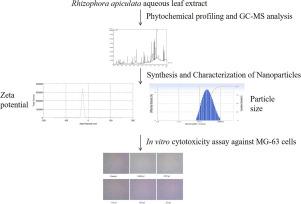Biomaterials Advances ( IF 5.5 ) Pub Date : 2020-07-03 , DOI: 10.1016/j.msec.2020.111252 Xiaozhou Wen 1 , Qiong Wang 1 , Tingting Dai 2 , Jie Shao 1 , Xiahui Wu 3 , Ziyu Jiang 3 , Joe Antony Jacob 4 , Chao Jiang 1

|
Rhizophora apiculata is a less studied tannin-rich plant of the mangrove ecosystem with potent biomedical applications. Tannins have been known to reduce silver ions into silver nanoparticles which in particular are known to possess cytotoxic effects against a variety of cancer cells. The aqueous leaf extract was prepared and quantitatively analyzed for its phytochemical content. According to the quantitative phytochemical analysis, the extract was rich in tannins and other reducing sugars. The reducing sugar-rich extract was further used for the synthesis of silver nanoparticles. Taking these facts into consideration, in this study, an eco-friendly approach was followed to biosynthesize silver nanoparticles using a tannin-rich Rhizophora apiculata aqueous leaf extract. The synthesized nanoparticles were partially characterized by our previous reports. This report further characterizes the particles by determining its average size, polydispersity index and zeta potential using dynamic light scattering. After characterization, the nanoparticles were tested for cytotoxic effects against human osteosarcoma MG-63 cells. The effects were analyzed by microscopic observation and MTT assay. The results indicate that the tannin-rich extract reduced the precursor silver nitrate into silver nanoparticles of favorable size for tumor infiltration. The nanoparticles possessed significant cytotoxic effects against MG-63 cells which could be possibly attributed to the antioxidant activity of silver nanoparticles. Further studies at the molecular level can indicate its potential in nanomedicine for the treatment of bone cancer at the clinical level.
中文翻译:

鉴定红树林植物水生根瘤菌的叶片提取物中可能的还原剂,这些还原剂对银纳米颗粒的制备及其对人骨肉瘤MG-63细胞的细胞毒性作用。
Rhizophora apiculata是红树林生态系统中单宁含量较高的植物,具有强大的生物医学应用。已知单宁将银离子还原成银纳米颗粒,特别是已知其具有针对多种癌细胞的细胞毒性作用。制备水叶提取物并对其植物化学含量进行定量分析。根据定量植物化学分析,提取物中富含单宁和其他还原糖。富含还原糖的提取物还用于合成银纳米颗粒。考虑到这些事实,在这项研究中,采用了一种生态友好的方法,利用富含单宁的Rhizophora apiculata生物合成银纳米颗粒。含水叶提取物。我们先前的报道部分表征了合成的纳米颗粒。该报告通过使用动态光散射确定其平均尺寸,多分散指数和Zeta电位来进一步表征颗粒。表征后,测试纳米颗粒对人骨肉瘤MG-63细胞的细胞毒性作用。通过显微镜观察和MTT分析来分析效果。结果表明,富含单宁的提取物将前体硝酸银还原为大小合适的银纳米颗粒,从而可浸润肿瘤。纳米粒子对MG-63细胞具有明显的细胞毒性作用,这可能归因于银纳米粒子的抗氧化活性。











































 京公网安备 11010802027423号
京公网安备 11010802027423号